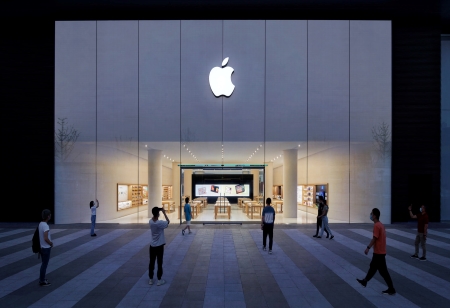
Apple's Chinese Suppliers Given Access to Expand in India

 More than a dozen of Apple Inc.'s Chinese suppliers have been granted preliminary permission to expand in India, assisting the tech giant's efforts to diversify its assembly network beyond China.
More than a dozen of Apple Inc.'s Chinese suppliers have been granted preliminary permission to expand in India, assisting the tech giant's efforts to diversify its assembly network beyond China.
Luxshare Precision Industry Co., which makes AirPods and iPhones, and a unit of lensmaker Sunny Optical Technology Group Co. are among the companies that have received approval, according to people familiar with the matter who asked not to be identified because the permits aren't public. According to the people, the clearances from key Indian ministries are a step toward full approval for expansion in India, and the companies will still be required to find local Indian joint venture partners.
Apple and other US electronics companies are attempting to reduce their reliance on China, following trade restrictions and Covid-related production disruptions that highlighted the risks of too much concentration in one country. The clearances indicate that India is allowing more Chinese companies to enter its tech manufacturing sector, despite rising political tensions between the Asian neighbours.
Prime Minister Narendra Modi has made expanding India's manufacturing sector a national priority, providing financial incentives and government support for company expansion projects. Apple has played a key role in this effort, with partners such as Hon Hai Precision Industry Co. producing more iPhones in the country than ever before for the latest generation.
According to the sources, Apple has given approval to 14 suppliers after naming them as companies whose services it needs to expand its presence in India. While the vast majority of Apple products are still manufactured in China, the company has begun manufacturing more of them in India through Taiwanese partners in recent years.
Luxshare, Sunny Optical, Apple, and India's technology ministry did not respond to requests for comment.
Based in Cupertino, California Apple has tight control over its supply chain, which includes hundreds of component manufacturers. Some Indian companies, such as the Tata Group, already supply parts to Apple, and the country is pushing to include more local providers in the supply chain in order to boost and diversify its electronics industry. Joint ventures with Chinese component manufacturers are one way to accomplish this.
After the countries' troops clashed violently on their long-disputed border in 2020, resulting in at least 20 deaths on the Indian side, India effectively cut off Chinese companies from its tech economy. The incident heightened anti-China business sentiment in the country.
Since then, India has banned apps from Alibaba Group Holding Ltd., Tencent Holding Ltd., and ByteDance Ltd., as well as raided, probed, and penalised a slew of other Chinese technology firms ranging from phone manufacturers to fintech service providers. It has tightened rules that prevent companies from neighbouring countries from entering without permission from the government, and Chinese firms have missed out on state incentives for tech manufacturers.
Meanwhile, India has steadily increased local smartphone assembly, allowing Taiwanese manufacturers Hon Hai, Wistron Corp., and Pegatron Corp. to establish plants. However, the absence of critical component manufacturers close to their operations has hampered the growth of the domestic industry.
While India is now approving the expansion of several Chinese suppliers, some are still being rejected, according to the sources. According to one of the people, Apple submitted a list of about 17 suppliers to Indian authorities, and a few of them were turned down, at least one because of direct ties to the Chinese government.
According to the sources, Han's Laser Technology Industry Group Co. and Shenzhen YUTO Packaging Technology Co. are among those being cleared.